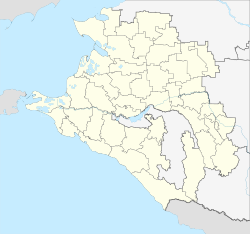Slavyansk-na-Kubani
| Slavyansk-na-Kubani (English) Славянск (Russian) |
|
|---|---|
| - Town - | |
 Welcome sign at one of the entrances to the town |
|
 Location of Krasnodar Krai in Russia |
|
|
|
|
|
|
|
|
|
|
| Administrative status (as of May 2013) | |
| Country | Russia |
| Federal subject | Krasnodar Krai |
| Administratively subordinated to | Town of Slavyansk-na-Kubani |
| Administrative center of | Town of Slavyansk-na-Kubani,Slavyansky District |
| Municipal status (as of June 2009) | |
| Municipal district | Slavyansky Municipal District |
| Urban settlement | Slavyanskoye Urban Settlement |
| Administrative center of | Slavyansky Municipal District, Slavyanskoye Urban Settlement |
| Statistics | |
| Population (2010 Census) | 63,842 inhabitants |
| - Rank in 2010 | 247th |
| Time zone | MSK (UTC+03:00) |
| Town status since | 1958 |
| on | |
Slavyansk-na-Kubani (Russian: Славя́нск-на-Куба́ни) is a town in Krasnodar Krai, Russia, located in the Kuban River delta. Population: 63,842 (2010 Census);64,136 (2002 Census);57,790 (1989 Census); 56,000 (1975).
Slavyansk originated in the Middle Ages as Copa or Coparia, a Genoese trade outpost controlled by the Ghisolfi family. After the fall of the Genoese power in the Pontic region, the site was abandoned until 1747 when the Crimean Khanate erected a small fort, known in Russian sources as Kopyl.
After the conquest of the Taman Peninsula by the Russian Empire, the Tatar fort gave way to the Cossack stanitsa of Kopylskaya. In 1865, it was renamed after the Slavyansky regiment that had been quartered there under Catherine the Great. In 1958, it was incorporated as the town of Slavyansk-na-Kubani (so called in order to distinguish it from the eponymous city in Ukraine).. The history of Slavyansk dates backs to the end of 18th century. This town was a fortress founded by General Suvorov to defend the sourthen borders of Russia. In 1865 the fortress became a Cossack stanitsa. During the Great Patriotic war this town was occupied by the fascists and it was liberated in 1943. In the town pack there are monuments to those who did not come back home from the war.
...
Wikipedia



